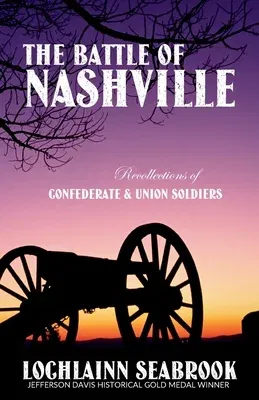The consequences of the Battle of Nashville, which took place December
15-16, 1864, are still being debated, but one thing is certain: the
Union victory there marked a major turning point in the War of 1861.
After losing three battles in a row, including Spring Hill (November 29)
and Franklin (November 30), Confederate General John Bell Hood and his
troops were forced to flee southward, leaving the all-important region
of Middle Tennessee largely under Union control. Confederate power in
the Western Theater had been vanquished, for as Yankees loudly and
proudly proclaimed, they had "crushed the backbone of the rebellion," a
victory that helped lead to Lee's surrender at Appomattox just a few
months later.
There are serious problems with this simplistic view, however. The Union
win at Nashville was not "a remarkable display of Northern military
skill," nor was the Confederate defeat "an illustration of the
inferiority of Southern generals," as we have been taught. For one
thing, the North had 82,000 soldiers at Nashville, the South a mere
20,000. In addition to a four-to-one numerical advantage, the North had
unlimited funds, weaponry, ammunition, clothing, and food, while many of
Hood's men were starving, coatless, and barefoot.
As for the so-called "Rebellion," the Right-wing South idolized the
Union and the U.S. Constitution, for both were largely a creation of
early Southern Conservatives, such as George Washington, James Madison,
Thomas Jefferson, and George Mason. Therefore Dixie had absolutely no
reason to "rebel" against the United States itself. What she was
actually protesting and challenging was the Left-wing takeover of
Washington, D.C., which commenced with the election of Liberal demagogue
Abraham Lincoln (the political platforms of the Republicans and
Democrats were reversed in the 1860s), who - eagerly supported by
GOP-backing socialists and communists - publicly stated that he was
willing to violate the Constitution in order to implement his
progressive policies (this promise Lincoln officially began fulfilling
on April 15, 1861). Furthermore, the Confederate Cause was not slavery,
racism, or treason, as our history books falsely preach. It was, and
still is, conservatism, a principle that is stronger and more vibrant
today than ever before. Clearly "the backbone of the rebellion" was not
"crushed" at Nashville!
So what are the facts about this famous conflict? In his small but
powerful book The Battle of Nashville: Recollections of Confederate and
Union Soldiers, award-winning author and historian Colonel Lochlainn
Seabrook allows those who were there (among them many of his Confederate
cousins) to answer this question. After reading the 30 eyewitness
accounts he provides, the reader will have a much better understanding
of the conflict, of the battles that led up to Nashville (which was
never meant to be fought), and even of the War itself. Illustrated with
rare images and generously footnoted, Col. Seabrook also includes a
thought-provoking introduction, battle statistics, 19th-Century maps, a
pertinent appendix, and a comprehensive bibliography. The Battle of
Nashville is part of Col. Seabrook's trilogy, "Hood's Tennessee
Campaign" series, which includes his popular companion books The Battle
of Spring Hill and The Battle of Franklin. All three are available in
paperback and hardcover.
The author and editor of nearly 100 books (currently), Col. Seabrook's
other titles include: Abraham Lincoln Was a Liberal, Jefferson Davis
Was a Conservative; Lincoln's War: The Real Cause, the Real Winner, the
Real Loser; Confederate Monuments: Why Every American Should Honor
Confederate Soldiers and Their Memorials, and the international
blockbuster Everything You Were Taught About the Civil War is Wrong, Ask
a Southerner!


